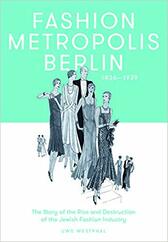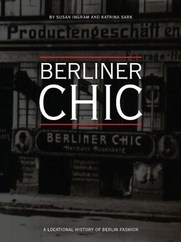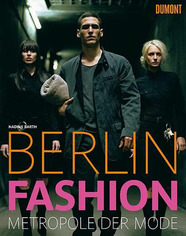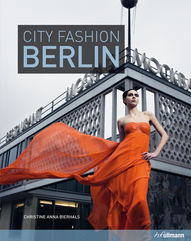Cultural History of German Fashion
Designed for the Department of History, University of Victoria
Course by Dr. Kat Sark
Course by Dr. Kat Sark
Course Outline:
(Subject to changes / in progress)
|
Week 1
|
Turn of the Century
|
SCREENING: TBA
|
|
Week 2
|
Weimar
|
SCREENING: Excerpt from Cabaret (dir. Bob Fosse, 1972) and Marlene Dietrich: Her Own Story (dir. J. David Riva, 2001) |
|
Week 3
|
War
|
SCREENING: Excerpts from A Foreign Affair (dir. Billy Wilder, 1948)
|
|
Week 4
|
Economic Miracles
|
SCREENING: Excerpts from The Marriage of Maria Braun (dir. Rainer Werner Fassbinder 1980)
|
|
Week 5
|
East Germany
|
SCREENING: Comrade Couture (dir.Marco Willms, 2009)
and excerpts from OstPunk! – Too much future (dir. Michael Boehlke, 2006) |
|
Week 6
|
West Germany
|
SCREENING: excerpts from Christiane F. (dir. Uli Edel, 1981)
|
|
Week 7
|
Reunified Germany
|
SCREENING: Excerpts from In Berlin (dir. Michale Ballhaus, 2009) |
|
Week 8
|
New Berlin
|
Timeline:
1850s to 1870s – The beginnings of “Berliner Chic” and a manufacturing industry (Hermann Gerson, Berlin vs. Paris, Berlin becomes capital under Bismarck)
1880s to 1900 – The rise of the ateliers and department stores (Heinrich Zille, Jewish manufacturers, Wilhemine Berlin)
1920s – Glamour and inflation (Cabaret, Marlene Dietrich, Irmgard Keun, advertising, fashion magazines, flappers, Kurfürstendamm and Weimar surfaces, consequences of WWI and the Versailles Treaty)
1930s – The destruction of the Jewish manufacturing Industry (Uwe Westphal, Nazi fashion)
1945 – Fashion in the ruins (Black Market, rubble women, cabaret entertainers, fabric shortages, female labour, Allied division of Berlin)
1950s – The economic miracle and the reconstruction years (Uli Richter, Heinz Oestergaard, and F.C. Gundlach, the New Look, from ruins to prosperity)
1960s – Berlin Wall – The rise and fall of an industry (DOB, Berlin vs. Düsseldorf, Cold War Berlin)
1970s and 80s – GDR Fashion Institute vs. Underground fashion scene (State-produced fashion, Comrade Couture, shortages and smuggled Western fashion, East-Berlin fashion)
1970s and 80s – Punk chic in West Berlin (David Bowie, Christiane F., subsidized and anarchic life on the “island” of West-Berlin)
1990s to present – Reunification and the contemporary transformations of the fashion industry (Fall of the Berlin Wall, German Reunification, end of East German fashion and manufacturing industry, Berlin as new capital of a New Germany, with a new fashion industry, Berlin Fashion Week, struggles for a fashion museum)
1880s to 1900 – The rise of the ateliers and department stores (Heinrich Zille, Jewish manufacturers, Wilhemine Berlin)
1920s – Glamour and inflation (Cabaret, Marlene Dietrich, Irmgard Keun, advertising, fashion magazines, flappers, Kurfürstendamm and Weimar surfaces, consequences of WWI and the Versailles Treaty)
1930s – The destruction of the Jewish manufacturing Industry (Uwe Westphal, Nazi fashion)
1945 – Fashion in the ruins (Black Market, rubble women, cabaret entertainers, fabric shortages, female labour, Allied division of Berlin)
1950s – The economic miracle and the reconstruction years (Uli Richter, Heinz Oestergaard, and F.C. Gundlach, the New Look, from ruins to prosperity)
1960s – Berlin Wall – The rise and fall of an industry (DOB, Berlin vs. Düsseldorf, Cold War Berlin)
1970s and 80s – GDR Fashion Institute vs. Underground fashion scene (State-produced fashion, Comrade Couture, shortages and smuggled Western fashion, East-Berlin fashion)
1970s and 80s – Punk chic in West Berlin (David Bowie, Christiane F., subsidized and anarchic life on the “island” of West-Berlin)
1990s to present – Reunification and the contemporary transformations of the fashion industry (Fall of the Berlin Wall, German Reunification, end of East German fashion and manufacturing industry, Berlin as new capital of a New Germany, with a new fashion industry, Berlin Fashion Week, struggles for a fashion museum)
Books:
Karin A. Wurst, Fabricating Pleasure: Fashion, Entertainment, and Cultural Consumption in Germany, 1780–1830 (2005)
Richard W. McCormick, Gender and Sexuality in Weimar Modernity (2001)
Katharina von Ankum, Women in the Metropolis: Gender and modernity in Weimar culture (1997)
Mila Ganeva, Women in Weimar Fashion: Discourses and Displays in German Culture, 1918-1933 (2008)
Thomas J. Saunders, Hollywood in Berlin: American Cinema and Weimar Germany (1994)
Barbara Kosta, Willing Seduction: The Blue Angel, Marlene Dietrich, and Mass Culture (2009)
Eugenia Paulicelli, Fashion Under Fascism: Beyond the Black Shirt (2004)
Eugenia Paulicelli, The Fabric of Cultures: Fashion, Identity, and Globalization (2009)
Katherine Pence, Paul Betts, Socialist Modern: East German everyday culture and politics (2008)
Shari Benstock and Suzanne Ferriss (eds.) On Fashion (1994)
Elizabeth Wilson, Adorned in Dreams: Fashion and Modernity (2003)
Stella Bruzzi, Undressing Cinema: Clothing and Identity in the Movies (1997)
Susan Ingram and Katrina Sark, Berliner Chic: A Locational History of Berlin Fashion (2011)
Richard W. McCormick, Gender and Sexuality in Weimar Modernity (2001)
Katharina von Ankum, Women in the Metropolis: Gender and modernity in Weimar culture (1997)
Mila Ganeva, Women in Weimar Fashion: Discourses and Displays in German Culture, 1918-1933 (2008)
Thomas J. Saunders, Hollywood in Berlin: American Cinema and Weimar Germany (1994)
Barbara Kosta, Willing Seduction: The Blue Angel, Marlene Dietrich, and Mass Culture (2009)
Eugenia Paulicelli, Fashion Under Fascism: Beyond the Black Shirt (2004)
Eugenia Paulicelli, The Fabric of Cultures: Fashion, Identity, and Globalization (2009)
Katherine Pence, Paul Betts, Socialist Modern: East German everyday culture and politics (2008)
Shari Benstock and Suzanne Ferriss (eds.) On Fashion (1994)
Elizabeth Wilson, Adorned in Dreams: Fashion and Modernity (2003)
Stella Bruzzi, Undressing Cinema: Clothing and Identity in the Movies (1997)
Susan Ingram and Katrina Sark, Berliner Chic: A Locational History of Berlin Fashion (2011)
Disclaimer: The contents of this site are copy-right protected and cannot be reproduced without the author's permission. © Katrina Sark, 2015.




